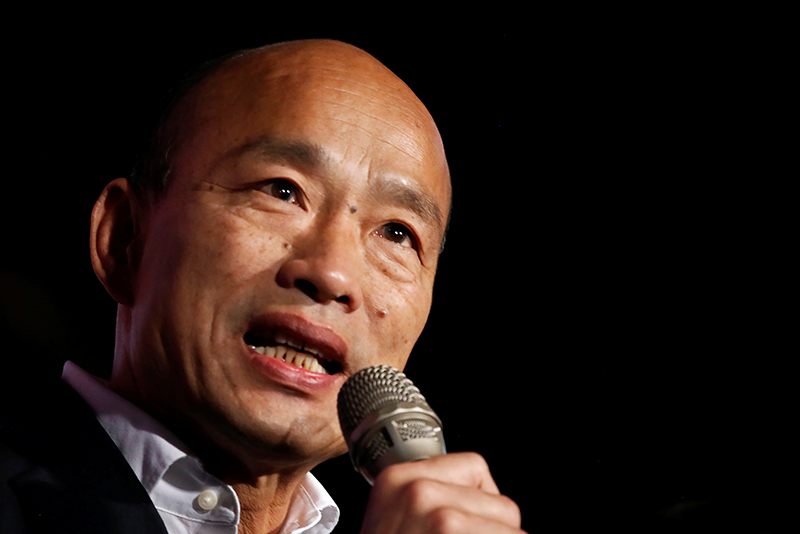Taiwan's China-friendly presidential hopeful faces backlash in divided south
- Signs of voter sentiment turning against populist Han
- Hong Kong concerns ripple through Taiwan's rural hinterland
- Election seen as vital to push back against China penetration
- South is traditional stronghold of pro-independence party
KAOHSIUNG: In balmy southern Taiwan, with its rural hamlets, industrial belts and slower-paced cities, a rising tide of residents are pushing back against opposition presidential hopeful Han Kuo-yu, fearing he'll sell out core Taiwan interests to China.
Han, the mayor of the south's biggest city of Kaohsiung, had been expected to build his support base over the past year since winning office on a promise to help citizens "make a big fortune" by forging better economic ties with China.
Instead, as he prepares for the election on Saturday against incumbent president Tsai Ing-wen and her independence-minded Democratic Progressive Party (DPP), he has seen his fortunes wane, hammered by criticism over controversial public remarks and failing to deliver on campaign promises, including oil exploration in the South China Sea.
Last month, a coalition of groups called "Wecare Kaohsiung" held a mass anti-Han rally that drew tens of thousands, some holding signs with the words "Dismiss pro-Communist mayor".
"Every Taiwan leader needs to find a balance between the US and China, but with Han, he has completely shifted towards China," said Aaron Yin, one of the leaders of the movement.
Taiwan's vote for a new president and parliament comes at a delicate moment for its giant neighbour, and sentiment in southern Taiwan has become a key factor for the election, which could set the democratic island's future course with autocratic China.
In March last year, Han, whose Kuomintang Party favours close ties with China, paid a high-profile visit to Hong Kong and China, where he met with senior Chinese officials and reiterated his commitment to "one China" as a core of cross-strait relations.
Han's red-carpet treatment raised alarm bells, as many Taiwanese harbour a deep mistrust of China, especially after Chinese President Xi Jinping threatened Taiwan with force.
"The main aim of this election is to reject any rapprochement with China," Yin told Reuters in a small office stacked with anti-Han pamphlets and those pledging solidarity with the pro-democracy protesters in Hong Kong.
POLITICAL MAVERICK
Han, 62, has proven a divisive figure since reappearing in politics in 2017 to make a failed bid for the chairmanship of the Kuomintang. Known for fiery rhetoric, his ability to electrify crowds helped him clinch the mayorship of Kaohsiung in late 2018.
Although Han has said "one country, two systems" isn't an acceptable model for Taiwan, he has promised to restart dialogue with China if elected president and called for an agreement between China's Communists and the Kuomintang that both sides belong to "one China", with each having their own interpretation of what that means.
Han has described Taiwan's formal independence as scarier than syphilis and warned that Tsai's re-election could lead to a "volcano eruption" of tensions with China.
Wang Lin Chiao, a Kuomintang politician seeking a parliamentary seat in the southern township of Meinong, said that stability is paramount, and that continued engagement with China is the only way forward.
"The 21st century belongs to China," Wang said as she campaigned on a quiet street with a three-person support team, struggling to find people to speak to.
"Taiwan needs a good future, so we don't want to meddle in sensitive political issues and change things. People only care about money here, and having a safe life," she said, noting a decline in Chinese tourists and exports of agricultural produce to China after curbs by Beijing last year.
But some, such as Chiu Yi-ying, a DPP lawmaker competing against Wang for the 222,700-voter constituency, say Taiwan must further deepen its "New Southbound Policy" of economic engagement with 18 countries in South-east Asia, rather than rely on China.
Chiu peppers her lobbying with Hong Kong references, telling older voters that an influx of Chinese immigrants and tourists into Hong Kong since the city returned to Chinese rule in 1997 had substantially lengthened queues at public hospitals and depleted supplies of essentials like milk-powder.
"That's when they really understand that Hong Kong today is Taiwan's tomorrow," she told Reuters in her campaign office, where massive billboards feature her smiling beside Tsai.
'IN A CAGE?'
Some farmers and pigeon breeders in the south's rural patchwork of ponds and fields say they've been scarred by past decades of conflicts with China and want to avoid that. But they can't ignore the realities of Hong Kong and the dangers faced by a more aggressive China under Xi.
"One country, two systems is not good," said Chen Jin-Wen, a pigeon breeder in the north of the historic port city of Tainan as he exercised his birds along a stretch of coastline overlooking the Taiwan Strait, referring to the model by which China has been ruling Hong Kong.
"You see what's happening in Hong Kong. The Hong Kong people are used to freedom, like Taiwan people," he said, as his racing birds pecked about in a wooden cage before bolting skywards.
"But mainland China is taking it away from them now," he said. "It's like my birds, they can fly free for a while but they always end up back in a cage."






